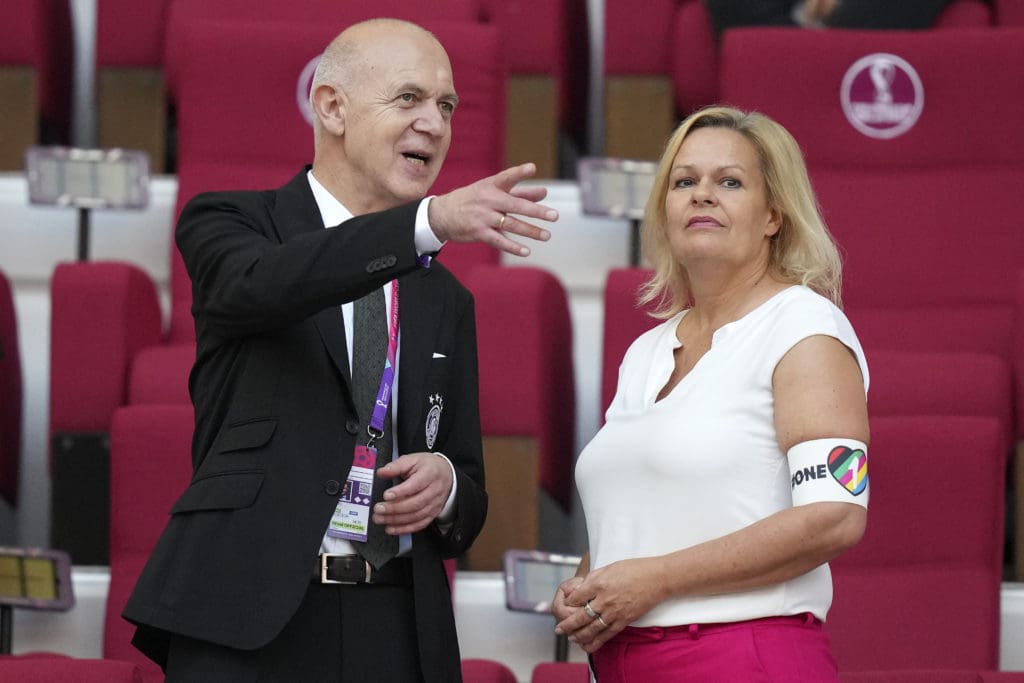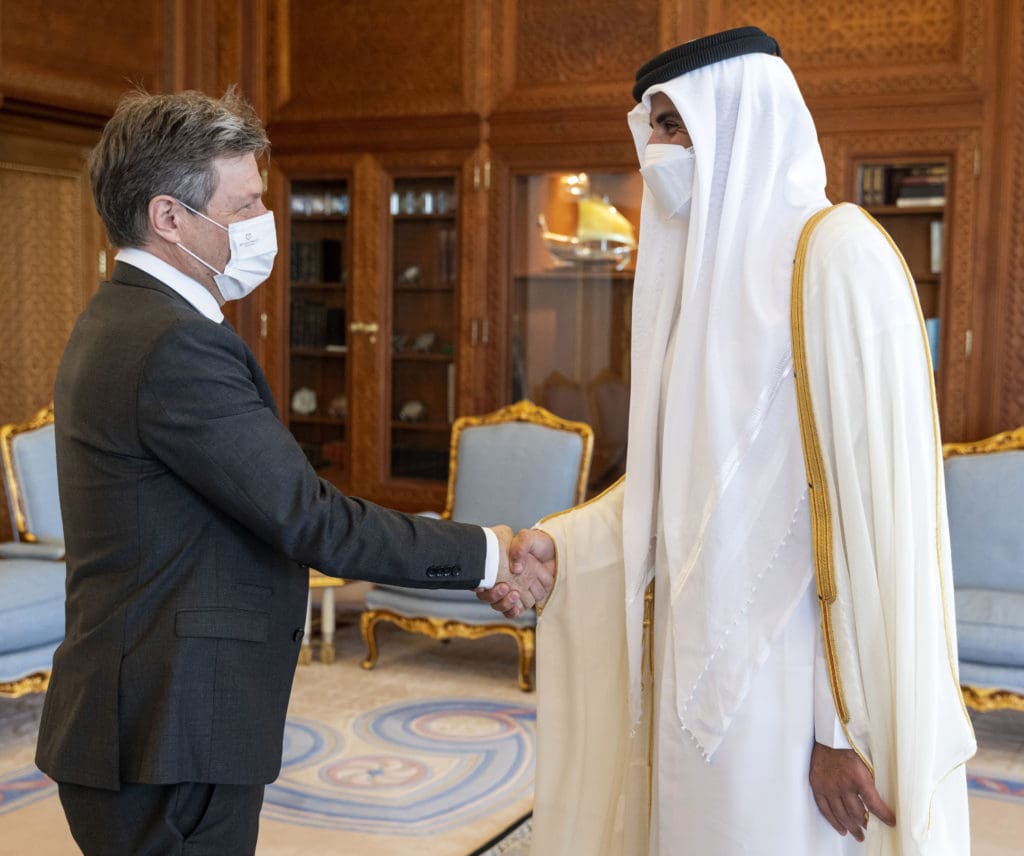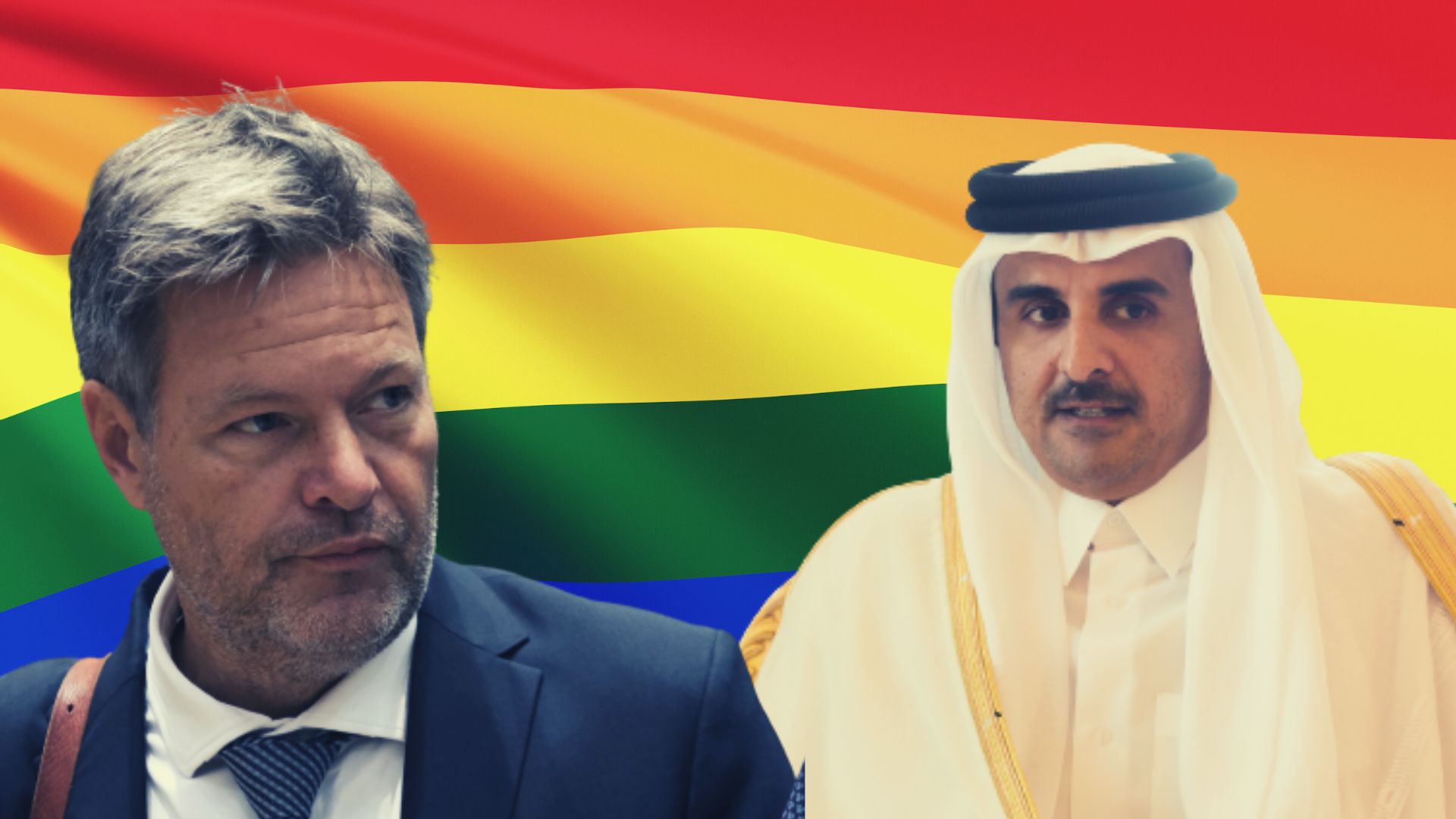The entire German political establishment went into a rage after FIFA banned the pro-LGBT “OneLove” armband at the World Cup. Germany’s economics minister, Robert Habeck of the Green Party, told the German national team they should defy the threat of sanctions and wear the armband anyway. Various government officials protested the move, including Interior Minister Nancy Faeser, who wore a OneLove armband during the opening game while cheering on the German national team.
Now, immediately after the “scandal,” Germany is proudly announcing a new gas deal with none other than Qatar — a deal Habeck has labeled as “super.” The deal may represent an energy coup for the new government, but perhaps just as important is that the deal demonstrates the German left-liberal establishment’s raw political and social engineering power — the amazing ability to virtue signal and then completely contradict that same virtue signaling a week later with zero repercussions.
It is important to remember that European foreign and energy policy is value-based, and while Qatar’s actions last week were abominable, Germany is forward-looking. Yes, Sharia-run Qatar is still known for its persecution of women and LGBT groups, and sure, Qatar has a far more oppressive, non-democratic system than Russia, and yes, there are still plenty of instances of outright slavery in Qatar, but in the words of Habeck, “15 years is great.”
He is, of course, referring to the fact that the LNG contract will begin running in 2026 and end in 2041.

How will Germany respond to future violations of human rights by Qatar? Will Germany pick up its gas in rainbow-colored tankers? Will it print special edition rainbow-colored euros to send to Qatari banks? Of course, this is all a bit of mockery, but the meaningless sentiment behind the “OneLove” armband is in essence the same strategy, and in reality, one could imagine such stunts at least being proposed by the “Twitter class” running PR for Germany’s current government.
The left is aided by the fact that the majority of German population continuously fails to process any contradiction in the German government’s smug support for “OneLove” armbands in Qatar while at the same time signing a gas deal with Qatar worth billions. While there may be some isolated grumblings in German media and the political classes, nobody in the left-liberal establishment, especially anyone with any real power among the Social Democrats or Greens, will truly dare to call out this absurdity.
The same element is at work as when the liberal darling Justin Trudeau crushed the trucker protests in Canada by literally freezing protesters’ bank accounts, seizing their property and even recently coming out in support of Chinese protesters; or when Gavin Newsom dined at California’s finest restaurant without a mask in violation of lockdown rules while calling those protesting lockdowns as dangerous and heartless. These politicians, just as the left-liberals in Germany, can blatantly violate the standards and values they pretend to promote because they can — because Big Tech, the media, academia, and the West’s various cultural establishments have created a force field around these chosen few, rendering them nearly impervious to being held accountable for their hypocrisy.
As N.S. Lyons writes, “Hypocrisy… is simply a display of power, so the more blatant it is the better. Hypocrisy is a concrete demonstration of living without having to fear consequences.”

The reality is the gas deal with Qatar is an example of hypocrisy, but also realpolitik, even if the left-liberals would never admit it.
Germany needs gas, but it cannot obtain the amount it needs without violating its own so-called moral standards, which is why it is reaching out to all those “detestable” countries such as Qatar, which are extremely anti-gay, but also quite Brown, a combination which creates a great deal of confusion in the German mind. Interestingly, the realpolitik deal with Qatar was necessitated by Germany actually ignoring realpolitik and abandoning Russian resources, but Russians are unapologetically White and not very happy about gay people, which is far easier for the German mind to process and outright disdain.
Overall, there is a remarkable lack of realpolitik from the current German political establishment, and some German industrial leaders, watching their fortunes potentially slip away, understand this. They may have been the ones whipping the inept Habeck to do something, anything, to secure Germany’s energy supply. However, this one act of realpolitik with Qatar will not save Germany, and a general inability to pursue national interests across a Europe still beholden to not only U.S. interests but also America’s cultural hegemony, is costing Europe dearly.
Russia and its resources are still there, and while what has happened to Ukraine is a tragedy, there are still those begging Europe to reverse course. If Germany’s Qatar gas deal flies in the face of the “liberal values” Germany portends to promote, then what real moral basis does Germany have for extending sanctions against Russia? It is a fair question. In Qatar, after all, they do not even bother with elections, and as independent opinion polls have historically shown, Putin is truly a popular leader who is legitimately elected time after time — far more popular than many of the leaders in Europe’s “liberal democracies.”
The reality is that Germany could, for the most part, avert its entire economic crisis by reverting to cheap Russian energy and resources. Hungarian Prime Minister Viktor Orbán has been ridiculed for calling an end to sanctions on Russia, arguing that Europeans are suffering more than Russians due to these sanctions. In light of the Qatar deal, Germany has little in terms of moral ground to stand on when it comes to its criticisms against Hungary, but it will continue to pretend like it does. In fact, it will likely double down on trying to remove Orbán from office. Deflection can do wonders in politics.
What is now quite clear is that Russia is not even capable of taking over Ukraine, let alone invading Germany or any other NATO country, and this war has proven it. Armed with this incredible knowledge, and with Russia’s glaring weakness on display, now would be the opportune time to press for peace and restore economic relations. Deals with Russia may not be in Europe’s “moral” interest, but neither are deals with Qatar. The U.S. has long partaken in illegal invasions of other countries, coup plots, and false flag operations, and all of this has never been a basis for Europe to stop doing business with the U.S.
Of course, the U.S., and in turn, the German media, would fight tooth and nail against such a dramatic foreign policy turnaround vis-à-vis Russia, even if some within Germany’s political establishment are secretly hoping for the war to come to an end without Ukraine necessarily pushing the Russians back to their border.
For now, moral grandstanding trumps raw national interest across Europe, and the German and European populations, even with gas deals from Qatar and the United States, will continue to pay for this new paradigm.






